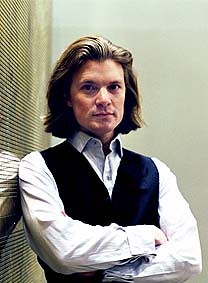Globalisation is good?
I’ve just been watching Johan Norberg's “Globalisation Is Good”, a documentary that was made in co-operation with the British Channel 4. I have never seen this many close-ups, cameras spinning around a person in different locations and dramatic entrances into the picture frame outside the world of cheap music videos. It feels a lot like the Eurovision Song Contest previews. And then there's the thrilling, and slightly indignant, narration made with Johans own spectacular British accent. Almost too weird to be true. I also have to mention the hair! There’s loads of hair! Hair tied in knots, free flowing hair in back lighting, hair blowing in the wind - it's hair everywhere! This guy is some sort of neo-liberal Samson. Globalisation is Good is almost like the political version of This Is Spinal Tap, sometimes I actually wonder if it’s Johan Norberg or Christopher Guest who’s walking down the streets of Stockholm or having a work out at the corporate gym with a Taiwanese businessman. It's very close to surreal. In his documentary Johan focus on three countries to state his case. Taiwan, Vietnam and Kenya. Taiwan and Vietnam are examples of the miraculous benefits of Nike, the free market and the glorious sweatshops of globalisation. Kenya is shown as an example of what will happen if the “dangerous and ignorant” anti-globalisation movement gets what it wants. A world full of corrupt socialist bureaucracies, subsidizations and protectionism.
As you probably already have understood, I don’t agree with him. If democracy, wealth and freedom will come automatically if you have sweatshops - then why has nothing changed in Latin America? They have had sweatshops for at least 100 years and still you don’t find any thriving democracies and economies there. Not yet at least. So what’s the difference between Latin America and Japan, Hong Kong, Taiwan and South Korea? Were there less state interference in the Asian countries than in the Latin American? Exactly how free has the market economy been in successful countries like South Korea and Japan? I quote japan.com: “Japan is the home of lifetime employment, long work hours, lots of rules and government regulations, and dedicated single-minded companies.” And both JapanZone’s article about the Japanese economy and Wikipedias article about the Economy of South Korea indicates that both the governments and the huge corporations (called zaibatsus in Japan) in both countries have been very involved in the economy. Very much like in Sweden or Germany. “In recent years South Korea's economy moved away from the centrally planned, government-directed investment model toward a more market-oriented one.” Centrally planned? Doesn’t sound very free market. There’s also an interesting article about the so called Asian Tiger Economies. I quote: “Taiwan's economy could not, wrenched in quick succession from Japan's orbit and then mainland China's, have developed without direct American aid, which constituted more than 30 percent of domestic investment from 1951 to 1962. Land reform, government planning, U.S. aid and investment, and free universal education brought huge advancement in industry and agriculture, and in living standards.” Johan Norberg didn’t mention any of that. There seems to be a need for many other factors than just a “free economy” and cheap labor to create a successful country. Free public education also seems to be a crucial factor together with political stability, good infrastructure etc.
So what about Kenya then? Well I actually agree with Johan. The combination of bureaucracy and corruption in many African countries and the huge amount of subsidizations, restrictions and protectionism that Europe and the U.S. use to protect their own farmers and industries are bad for the Kenyan and African economy. But will foreign owned sweatshops solve that? I don’t think so.
Documentary Ultra Light
Johan Norbergs "Globalisation is good" feels very lightweight and cheap. There's no references to current economical research or interviews with any economist, researcher or thinker besides Johan himself. He makes no effort at all to define what he thinks Globalisation is and what is needed for it to work more than a deregulated economy. I think that's lazy. I liked Joel Bakans The Corporation much better. It was more interesting and presented many different views without becoming unfocused and missing its point - that corporations can be both very useful and very harmful depending of how you choose to use them. So if you want some fresh ideas, then skip Johan’s This Is Globalisation documentary and try The Corporation or the post-autistic economics network instead.
“Conventional economics remains fixated on the view that economics is the physics of society. In other words, most of the profession behaves as if there were a single universally valid view of the world that needs only to be applied.”
Paul Ormerod
“. . . the close to monopoly position of neoclassical economics is not compatible with normal ideas about democracy. Economics is science in some senses, but is at the same time ideology. Limiting economics to the neoclassical paradigm means imposing a serious ideological limitation. Departments of economics become political propaganda centers . . .”
Peter Söderbaum
Monday, September 26, 2005
globalization is good - great hair is even better 1.2
Subscribe to:
Post Comments (Atom)




No comments:
Post a Comment